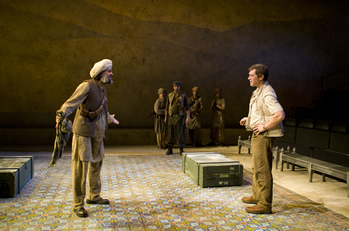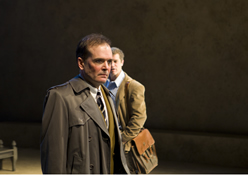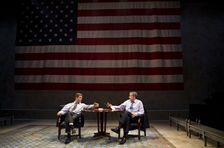
Occupational Hazards
By Jonathan Kalb
Blood and Gifts
By J.T. Rogers
Mitzi Newhouse Theater
150 W. 65th St.
Box office: (212) 239-6200
In her splendid analysis of The Great
Game [published on HotReview],
the Tricycle Theatre's widely praised, eleven-hour cycle of plays
about Afghanistan set between 1842 and 2010, Erika Munk observes
that, informative as that earnest theatrical marathon was, it
was also disturbingly complicit with our current military involvement
there. Yes, the plays asked critical questions about western intervention,
and taught valuable history about the country to those who would
never otherwise learn it, but almost all the dramas nevertheless
portrayed the Afghans as too brutal, backward and corrupt ever
to be left to themselves and thus implied that intervention is
and always was justifiable and unavoidable.
Because no play seriously considered the
option of the great powers simply not playing the fateful "great
game," the cycle ended up suggesting that occupying Afghanistan
has always been the quintessential white man's burden, no less
for the United States in 2002 than for the Soviet Union in 1979
and Britain in the 19th century. Occasional atrocities by exhausted
and overburdened troops were treated as understandable occupational
hazards. Small wonder high-ranking British and American military
officials praised The Great Game when it was performed
privately for them last year in London and Washington.
How one feels about J.T. Rogers's Blood
and Gifts--a full-length expansion of a one-act originally
written for The Great Game, now receiving a superb production
at Lincoln Center directed by Bartlett Sher--will very much depend
on one's attitude toward the complicity Munk describes. If, like
me, you believe that every penny and drop of blood America has
expended occupying Afghanistan has been disastrously squandered--and
that this should have been obvious from the moment Bush unilaterally
declared 9/11 an act of war rather than a crime--then Rogers's
play may enrage you. The rage will be an extension of the feelings
that all of Bush's maladroit overreactions fomented for eight
years. If, on the other hand, you are a forgiving "water under
the bridge" type, if you think the putative good intentions of
well-meaning cowboy-patriots are interesting despite the horror
their ignorance and impulsiveness wreak, and that sensitive hindsight
examination of their motives can be the stuff of powerful lessons,
then this might be the play for you.
Rogers is nothing if not fair-minded. He
has interviewed experts to get his details right, as he told the
Lincoln Center Theater Review: "What would you eat if
you went to a party at the embassy? What are the kinds of things
you would do? What would piss you off?" Blood and Gifts
is indeed impressively realistic. It tells a touchingly compassionate
tale about a well-meaning, square-jawed CIA agent named James
Warnock (Jeremy Davidson) who is bent on outwitting the Pakistani
ISI during the 1980s. Because the U.S., Britain and Saudi Arabia
want to arm the Afghan mujahidin against the Soviets secretly,
they give the ISI control over which commanders to support.
 The
ISI chief--slimy and arrogant--chooses a bloodthirsty Islamist
named Hekmatyar whom he thinks can be turned into a puppet after
the Soviets leave, and Warnock works behind his back to arm a
competing leader, Abdullah Khan, considered more humane and U.S.-friendly.
Advising and helping Warnock is a jaded, weather-beaten MI6 agent
named Simon Craig (exquisitely played by Jefferson Mays), who
is much more knowledgeable than anyone in the CIA and who lends
the play something of a soul by warning (ineffectually) about
various pitfalls. Brittle and ignored, Craig proves to be the
hapless conscience of the play, as all the awful things he predicts
come about, most horribly (because wholly avoidable) the power-grab
by Islamic radicals after America callously abandons Khan and
all of Afghanistan in the wake of the Soviets's withdrawal.
The
ISI chief--slimy and arrogant--chooses a bloodthirsty Islamist
named Hekmatyar whom he thinks can be turned into a puppet after
the Soviets leave, and Warnock works behind his back to arm a
competing leader, Abdullah Khan, considered more humane and U.S.-friendly.
Advising and helping Warnock is a jaded, weather-beaten MI6 agent
named Simon Craig (exquisitely played by Jefferson Mays), who
is much more knowledgeable than anyone in the CIA and who lends
the play something of a soul by warning (ineffectually) about
various pitfalls. Brittle and ignored, Craig proves to be the
hapless conscience of the play, as all the awful things he predicts
come about, most horribly (because wholly avoidable) the power-grab
by Islamic radicals after America callously abandons Khan and
all of Afghanistan in the wake of the Soviets's withdrawal.
Blood and Gifts features slimy
politicians, duplicitous commanders, and ignorant goons on all
sides. It is--I must concede--refreshingly untendentious, marvelously
researched (the embassy food is utterly convincing), splendidly
acted, and smartly directed, with offstage characters seated at
all times around the edges of the stage as silent witnesses who
occasionally confront others with meaningful glances and gestures
during entrances and exits. Like The Great Game, Rogers's
play is a fine teaching tool, serving up many books' worth of
complex and important history as entertainment. In that sense,
Blood and Gifts delivers as much as can be expected from
its particular genre of realistic historical fiction. It teaches
historical facts to people who would never seek them on their
own and can thus proudly claim the mantle of Enlightenment social
benevolence.
As I make that concession, however, and
tell myself how much "better than nothing" Blood and Gifts
was, I find my thoughts drifting toward Trofimov's famous remark
to Lopakhin near the end of The Cherry Orchard:
… allow me to give you one piece of
advice at parting: don't wave your arms about! Get out of that
habit--of arm-waving. And another thing, building cottages and
counting on the summer residents in time becoming independent
farmers--that's just another form of arm-waving.
A play like Blood and Gifts, or
the one-acts of The Great Game, is, for all its good
intentions, the equivalent of dramatic arm-waving in our time.
Yes, it teaches (selectively) and thus lessens ignorance among
the tiny group of citizens wealthy and privileged enough to see
it, but the very modesty and conventionality of that ambition
essentially dooms it to political ineffectuality, if not complicity
with intervention. This is the ideal sort of drama for the History
Channel age, when just about any atrocity, policy blunder, public
lie, or colossally wasteful expenditure can evidently be packaged
as inoffensive infotainment. One can almost guarantee before it
opens that such a play will be so inoffensive it can do nothing
to impede the massive and chronic misgovernment whose background
it describes.
 Shaw
once said to an ambitious young playwright who wrote asking for
career advice that she should "do something to get yourself into
trouble." The historical avant-garde was entirely built on that
premise. Today, many say, artistic avant-gardism is moribund,
its energies dissipated by the leveling effects of media-age cynicism
and postmodernism. Whatever the truth of that, the Occupy movement
shows that the core idea still has traction. If you provoke people,
even (especially?) in the pseudo-serious era of Colbert and O'Reilly,
they will pay attention, and sometimes even be roused to activism.
If you don't, they will stay benumbed and asleep, even if you've
gone to the trouble of teaching them a few things.
Shaw
once said to an ambitious young playwright who wrote asking for
career advice that she should "do something to get yourself into
trouble." The historical avant-garde was entirely built on that
premise. Today, many say, artistic avant-gardism is moribund,
its energies dissipated by the leveling effects of media-age cynicism
and postmodernism. Whatever the truth of that, the Occupy movement
shows that the core idea still has traction. If you provoke people,
even (especially?) in the pseudo-serious era of Colbert and O'Reilly,
they will pay attention, and sometimes even be roused to activism.
If you don't, they will stay benumbed and asleep, even if you've
gone to the trouble of teaching them a few things.
Maybe it's idle to wish that Blood
and Gifts were some sort of fire-breathing polemic about
the Afghan quagmire, or a guerilla event that made news by, say,
occupying public spaces and getting people arrested. That, however,
is where the active and activist mind goes in a time like ours,
contemplating savage political games in plush theatrical comfort.
